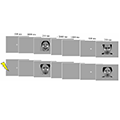Abstract
The current study aimed to investigate whether induced anxiety, as well as trait anxiety, would lead to the failure of the regulation of emotional conflict. To measure the regulation of emotional conflict, the congruency sequence effect (CSE), which is a reduced effect of task-irrelevant distractor after incongruent trials compared to congruent trials, was observed while participants performed an emotional conflict task. In Experiment 1, participants performed the task in a safe context and a threatening context where a couple of electric shocks were given randomly on two consecutive days. In Experiment 2, participants performed the same task in either a safe or threatening context to avoid a potential carryover effect of the threat. The CSE observed in the safe context disappeared in the threatening context as well as in participants with high-trait anxiety level even without the threat. The findings imply that induced anxiety causes a failure of cognitive control that engenders the CSE in emotional congruency tasks. Moreover, such failure driven by participants’ trait anxiety level might be a potential predisposing factor leading to anxiety disorders. Overall, these results suggest that induced anxiety, as well as trait anxiety, has an adverse impact on the sequential modulation of emotional conflict.
